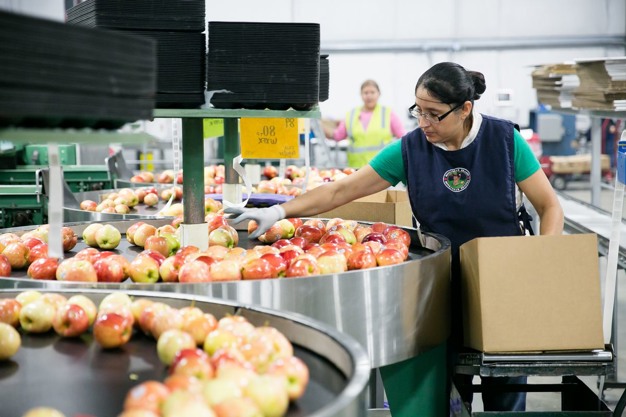As a result of record U.S. apple production, there is a lot more fruit in storage this year compared to the same time last year. Washington, the country's largest growing state, has 24 percent more fruit in storage this year compared to last. "The Honeycrisp variety has double the amount in storage closely followed by Cosmic Crisp and Granny Smith with large stocks," says Don Roper with Honeybear Marketing. Fuji, and Cripps Pink are also long on supply. The only variety that seems to be short on supply is Gala as well as several organic varieties.

Input costs
What's hurting growers tremendously is the rise of input costs, mainly labor and farming supplies, with the Producer Price Index (PPI) showing an increase of 34 percent. The Consumer Price Index (CPI) on the other hand is down 11 percent. "This year, the CPI is up for all fruit varieties, except for apples," shared Roper. "Because supply of apples is so long, it is affecting the farm gate price in a negative way and many growers are losing money on every case right now," he commented. "We are clearly in a supply exceeds position from an industry standpoint."
To save on input costs, some growers are cutting down on orchard management. "Growers have to decide where to save money in order for the orchard to make any money or lose the least amount of money," Roper said. If they decide to not prune the fruit or reduce other inputs, it will result in a sub-optimal yield, generating even lower farm gate price. "It's a downward cycle." With new, high-yielding orchards still coming into production, Roper believes the situation of apple oversupply will continue for another 18 to 24 months. "While total apple acreage is coming down, the yield/acre from new trees is up significantly, resulting in a net production increase." Unless Mother Nature brings a significant weather event, U.S. apple production is expected to continue to be in a situation of oversupply for the near future.
Roper is confident that farmers who invested in new and high-yielding varieties over the years will make it through. Additionally, the amount of money put into savings will make a big difference this season. "Growers who managed returns wisely in the successful years are in much better shape than those who didn't."

New crop
Harvest of the new crop is not too far out, but what will happen with the storage crop if it hasn't been sold before new harvest starts? "It is important growers start shipping the fresh, new crop as soon as it is available," said Roper. "Consumers are able to tell the difference between a storage apple and a fresh apple. It only takes one bad eating experience, and we lose that apple consumer for several weeks. We need to start off with our best fruit and since we want consumers to come back for repeat purchases, we need to drive velocity of sell-through by offering consumers a fresh crop apple."

Apple share is flat to declining
It won't be easy to improve grower margins with many new trees coming into production. However, the industry basically has two options: decrease production or increase demand. "We used to have the campaign "An Apple A Day Keeps the Doctor Away" and it was very successful," Roper shared. However, in the past 20 years, we haven't done a good job in promoting apples." The health benefits of apples are no longer being discussed while apples are still the #1 or #2 fruit health wise. In recent years, the apple industry has lost market share to other commodities at retail, including berries and citrus. It's important to sharpen the message. "Our industry as a whole is working to develop a cohesive message around the benefits of apples to help drive consumption to the next level and I know we can do this. There is a lot of market share to capture, and I think our whole industry will get sharper with messaging and eating opportunities for apples. We just have no choice. We will either need to take trees out of the ground or grow consumption through collaborative consumer marketing campaigns."
 For more information:
For more information:
Don Roper
Honeybear Brands
[email protected]
www.honeybearbrands.com
